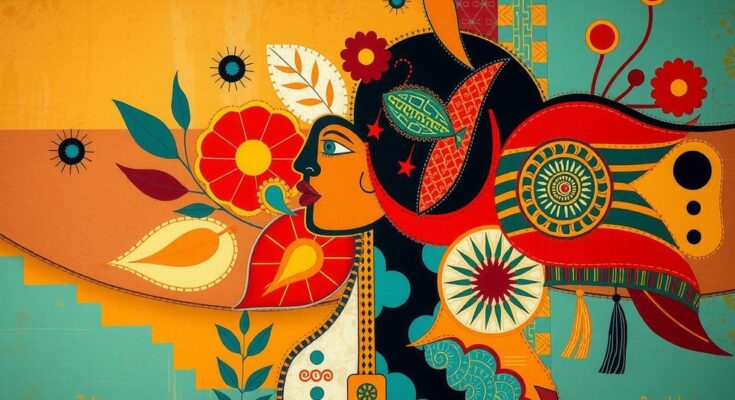The civil war in Sudan has devastated its emerging art scene, displacing artists who continue to express their identities from abroad. Artists like Rashid Diab and Yasmeen Abdullah navigate their experiences of exile while striving to preserve Sudan’s cultural heritage through their work. The narrative illustrates the resilience and commitment of Sudanese artists in the face of adversity, underscoring the critical role of art in reflecting national identity amidst loss.
In a recent video call, Rashid Diab, a prominent artist and art historian from Sudan, alongside his son Yafil Mubarak, delves into their reflections on Sudan’s art scene, which has been severely impacted by ongoing civil conflict. Residing in exile in Madrid for nearly two years, they engage in profound discussions about national identity, belonging, and the essence of being Sudanese amidst destruction. Diab underscores, “The real Sudanese are those who respect their people and seek a better future for the nation.”
The civil war that erupted in April 2023 has devastated the flourishing art scene in Sudan. Prior to the conflict, Khartoum’s Downtown Gallery had gained prominence, showcasing over 500 artworks, including significant pieces from both established and emerging artists. However, the war has led to destruction and abandonment, with the gallery’s founder, Rahiem Shadad, estimating the loss of thousands of artworks, particularly those of elder artists that remain undocumented.
Among the artists displaced by the conflict is Yasmeen Abdullah, who now resides in Muscat, Oman, after fleeing Khartoum while pregnant. Abdullah expresses her ongoing commitment to art as a source of light amidst adversity. Her works, inspired by the poetry of Mahmoud Darwish, capture surreal scenes reflective of her experiences and the resilience of her people. She hopes her creations will resonate with her son as he grows.
Ala Kheir, another Sudanese artist, shifts his focus on photography to document Sudan’s current destruction through his program, The Other Vision (TOV). Kheir emphasizes the urgency of highlighting the human experience in Sudan amidst the war, stating, “If I do not do it, no one else will.”
Rashid Diab grapples with the meaning of creating “African art” while living abroad, asserting that despite being displaced, his spirit remains tied to Sudan. His work vividly illustrates the daily life of Sudanese people, now filled with poignancy due to the profound loss experienced.
Still, artists like Yasmin Elnour, now based in London, continue to explore identity through their work, reflecting on the diasporic experience and the enduring nature of cultural ties. Elnour asks whether identity necessitates a physical place, posing a thought-provoking question about existence amid loss.
Mubarak concludes their discussion by affirming the role of art in showcasing Sudan’s identity, highlighting the necessity of preserving and presenting their culture. He states, “We can show the world that Sudan is more than endless civil war and bloodshed; we are thinkers, creators, and philosophers.”
The ongoing civil war in Sudan has severely disrupted its flourishing art scene, displacing many artists who continue to strive for artistic expression while in exile. Artists like Rashid Diab, Yasmeen Abdullah, Ala Kheir, and Yasmin Elnour show resilience and a commitment to preserving Sudanese culture despite their physical distance from their homeland. Their work not only reflects their personal experiences but also acts as a testament to the rich and diverse identity of Sudan, emphasizing the importance of art in conveying the realities of their culture.
Original Source: www.artnews.com




